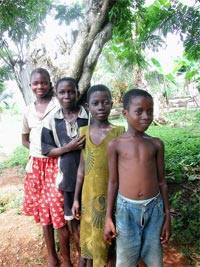by Stephanie Saldana
Twelve years ago, I travelled to a monastery in the Syrian desert, where I met an Italian priest by the name of Father Paolo Dall'Oglio. For 20 years, he had been living in…
Christian-Muslim relationships
by Stephanie Saldana
Twelve years ago, I travelled to a monastery in the Syrian desert, where I met an Italian priest by the name of Father Paolo Dall'Oglio. For 20 years, he had been living in…
by Dawn Anahid MacKeen
The following is a chapter from MacKeen’s book recounting how she finally meets the descendants of Sheikh Hammud al-Aekleh, whose family welcomed in her grandfather, saving his life. Some members of the family that greeted her in 2007 today are Syrian refugees themselves.
by Dawn Anahid MacKeen
The following is a chapter from MacKeen’s book recounting how she finally meets the descendants of Sheikh Hammud al-Aekleh, whose family welcomed in her grandfather, saving his life. Some members of the family that greeted her in 2007 today are Syrian refugees themselves.
by Patrick McInerney
“It was the best of times, it was the worst of times, it was the age of wisdom, it was the age of foolishness, it was the epoch of belief, it was the epoch of incredulity, it was the season of Light, it was the season of Darkness, it was the spring of hope, it was the winter of despair.” These opening lines from Charles Dickens’ A Tale of Two Cities could equally describe our times.
by Audri Scott Williams
Recently I decided to run for political office in 2018 for the state of Alabama. I will be a progressive Democratic candidate in Alabama’s Congressional District 2, for the U.S. House of Representatives. Friends who know me well have asked me, “Why are you running for a political office?”
by Dawn Anahid MacKeen
The following is a chapter from MacKeen’s book recounting how she finally meets the descendants of Sheikh Hammud al-Aekleh, whose family welcomed in her grandfather, saving his life. Some members of the family that greeted her in 2007 today are Syrian refugees themselves.
by Paul Chaffee
What does living life as an ‘interfaith activist’ mean? Millions have joined the cause in recent months, so we can well ask ourselves: What do interfaith activists share in common within our own communities and in the world? A quick, simplistic answer might be that all of us are striving towards peacemaking with ‘the other.’
from the Center of Christian-Muslim Relations of Sydney
“Similar to fasting and abstinence, communal meals play an important seasonal role in the life of the Melkite, that is Greek-Catholic, Church. As a practicing Melkite, my church community often celebrates together with meals on the church grounds, particularly on feast days ...
by Michael Reid Trice
Twenty fifteen is a year for remembering massacre. This past July marked the twentieth summer since the summary executions in the municipality and town of Srebrenica, where over 8,000 Bosnian Muslims…

Children in Ghana are being raised in a ‘dialogue of life’ that makes religious differences a source of friendship, not conflict. [Source]
A religious revolution has emerged in many local African communities and nations as a whole in the last one hundred years or so. Within the period, various religions have come to live in closer proximity with one another than they had during the previous century. African towns and cities now collaborate with churches and mosques and to a lesser extent traditional/primal religious activities.
Subsequently, at the present time, people of different faiths encounter one another more often in both structured and unstructured ways. For example, in many homes across Ghana and the Gambia, it is common to find followers of African indigenous religions, Christianity, and Islam – with all the different groups of Christianity and Islam living together. By extension such relations are carried to the larger village or town community.